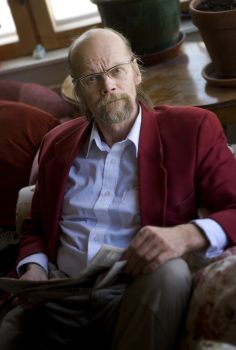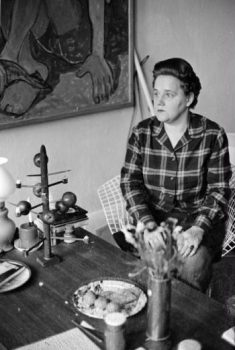Search results for "herbert lomas/www.booksfromfinland.fi/2004/09/no-need-to-go-anywhere"
The enchanted garden
31 December 1993 | Archives online, Fiction, Prose
An extract from Säädyllinen murhenäytelmä (‘A respectable tragedy’, 1941). Introduction by Soila Lehtonen
Artur sat on the balcony and contemplated the windowpanes, hot and bright as dragonfly’s wings. He reached into his pocket and produced an ivory cigarette-holder, inserted a fresh salt-capsule and a cigarette, and began smoking, but the cigarette was not to his taste. His mouth felt hot and dry; he probed the roof of his mouth with his tongue.
An ant was making its way across the floor; Artur’s gaze rested on the garden’s universe of flowerbeds, swarming with insects and blooms; the atmosphere in the garden had the tint of hot dust, apart from the lawn, with its limeblossom-tinged half light. He started to make for the garden: the flowers would all be needing water, and he could go for a swim in the pond. But first he wanted to take a look at his mother: she might manage an hour’s sleep in this heat. He tapped a drift of blue-grey cigaretteash onto the floor. He tiptoed heavily to the old lady’s door, making the floorboards creak, and opened it a fraction. In the green aqueous light thrown by the blind he could make out the reposing outlines of a weak, almost immaterial body; her throat and chest moved gently under her star-crocheted lace, but otherwise the old lady was sleeping lightly as a bird. More…
To live, to live, to live!
31 December 2001 | Archives online, Fiction, poetry
From Kaukainen puutarha (‘A distant garden’, WSOY, 1924). Introductions by Vesa Mauriala and Leena Krohn
Flowering earthThe earth’s spilling out purple lilac clusters, To live, to live, to live! So what if death’s coming! |
Kukkiva maaMaa kuohuu syreenien sinipunaisia terttuja. Elää, elää, elää! Mitä siitä, että kuolema tulee! |
Troubled by joy?
30 September 1998 | Fiction, poetry
Poems from Boxtrot (WSOY, 1998)
Nine lives
So far nine lives only, and
all mine, like my head in my hands.
My first was curled up at the foot of a fir tree
in the autumn forest just at day-dawn
in nighttime's raindrops.
The resin's still in my fingernails.
My second was the scent of split wood by the shed,
and the circular-saw blade's horrific disc.
The gruel, track shoes too large, and President Kekkonen,
ink spreading across my notebook, and
the clank of the railway under my dreams.
Mayday's red flags, the neighbour's daughter
naked, and dead pigeons lying on the gravel.
My third life was the discovery of anger, blind rage
turning and turning me in its leather bag,
wearing the edges of my day down. Sitting at our schooldesks
being forced towards a goal that can't be named.
Seeing how they start drinking, drinking
into their eyes that black impotent rebellion.
I'm on the point of drowning, someone's traversing
the Atlantic in a reed boat. And if I did die,
it wouldn't matter who sneered. The stars in the sky
are watching us in horror.
Family mysteries
31 March 2003 | Archives online, Fiction, poetry
Extracts from Einen keittiö, Eines kök (‘Eine’s kitchen’, Tammi, 2002). Introduction by Satu Koskimies
This sort of detached block of flats is as much of a living organism
as the folk dwelling in it.
For above are the brains and below are the intestines and outlets.
The upper floors were flaunting their kitchen taps, sink-tops,
lion-clawed sofas, mahogany chests and
sapphire-pendant crystal chandeliers, flashing the violet-tones of sea and
rain. More…
Narcissus in winter
31 December 1984 | Archives online, Fiction, Prose

Risto Ahti. Kuva: Harri Hinkka
Poems from Narkissos talvella (‘Narcissus in winter’, 1982). Introduction by Pertti Lassila
Risto Ahti (born 1943) published his first work in 1975. His poetic expression finds form remarkably often in prose poems, and Narkissos talvella is made up exclusively of these. His poems transmute language into a mystical, surreal world, sometimes enigmatic and subjective in the extreme, and at its best strangely suggestive. It is as if Ahti’s world were in a state of constant change, subjected to a relentless process of demolition and rebuilding. The experience of the individual, generally his encounter with truth, is central to many of Ahti’s poems; the inner reality of a person manifests itself as more essential than the outward appearance. Ahti’s poems exhibit a fruitful contradiction: on the one hand, the accuracy with which he uses words and, on the other, the continual shape-changing and lack of definite boundaries of the world they describe. More…
An intimation of Paradise
31 December 1984 | Archives online, Fiction, poetry
Poems from Paratiisiaavistus (‘An intimation of Paradise’, 1983). Introduction by Pertti Lassila
Satu Salminiitty (born 1959) has published only one collection of poetry since her first appeared in 1981, but with these two volumes she has achieved considerable success. She writes with a fine rhetoric using language and rhythm that are far removed from those of spoken Finnish. Religious pathos has a prominent place in her work, and her poems often derive from praise, prayer or even magic incantations; Salminiitty is a creator of vision who trusts to her metaphysical intuition, a quality not generally discernible among today’s Finnish poets. Equally rare is her lively faith in the goodness and beauty of people and of the world. A conscious rejoinder to materialism, pessimism and fear of the future can be read in her poems. More…
Bearded Madonna
31 December 1984 | Archives online, Fiction, poetry
Poems from Parrakas madonna (‘Bearded Madonna’, 1983). Introduction by Pertti Lassila
The first volume of poems by Eira Stenberg (born 1943) appeared in 1966; since then she has published both poems and children’s stories. In her most recent collection, she examines human relationships within the family, divorce, motherhood and childhood. Stenberg’s voice is clear and concrete. Her treatment of both mother and child is unsentimental, sometimes ironic; perceptively and farsightedly she deals with the importance of childhood in the way it predestines the fate of the individual. No love or hate burns/ like that we receive as a gift from childhood, Stenberg writes in one of her poems. The home – protective, restrictive and punishing – is often the scene of her poems. The man, the father, is the butt of considerable irony and criticism, but Stenberg also destroys the myth of the madonna-like mother and the idyll of the home. More…
Poems
31 March 1998 | Fiction, poetry
Agnosis IV
Set your altar up in the evening,
in the morning clear it away:
the wandering goes on. Don't persuade yourself
of anything, or anyone else:
fearful forces are epidemic,
no place is sacred
for long.
Again and again
the sacred
starts.
If you happen to be there
don't refuse to see.
a light wind
stirring a treetop:
a shoal of fish
in blue abyss
Eroica
31 December 1984 | Archives online, Fiction, poetry

Ilpo Tiihonen. Photo: Irmeli Jung
Poems from From Eroikka (‘Eroica’, 1982). Introduction by Pertti Lassila
Ilpo Tiihonen (born 1950) published his first collection of poetry in 1975. From the beginning, his poems have been couched in the language of the street, and he uses slang liberally. Tiihonen has always been opposed to the miniature idylls of nature that were so characteristic of the 1970s. He aims at the secularisation of poetry, and he uses humour and comedy as a counterweight to high culture. He has evidently been influenced in his technique by Mayakovsky and Yesenin, to whom he often refers in his poems. His preferences in the poetic tradition are apparent in the fresh and liberal new interpretations of poems by Gustav Fröding contained in his collection Eroikka. Unusually for a contemporary Finnish poet, Tiihonen makes extensive use of rhyme. The result is often strongly lyrical poems that could almost be called modern broadsheet ballads, and may also bring Brecht to mind. More…
Asking for more
14 April 2010 | Fiction, poetry
The heroines in Vilja-Tuulia Huotarinen’s new collection, Iloisen lehmän runot (‘Happy cow poems’, 2009), are timeless creatures, mythical and archaic, and yet our contemporaries, living their lives alongside us (see Ruminations)
Let the cows out on Monday
and they’ll enter the forest, wander far
aim for the waterfalls, the hole in the rock and down the precipice.
The dead come back along our the road to our yard:
Rebecca, Isolde, Rosamunda.
Allison, Eulalia, Euphrosyne.
Not as ghosts but as old friends.
Whom will they, the wingless ones, protect here?
A lean lass, a lean lass. More…
Three short stories
30 June 1987 | Archives online, Fiction, Prose
from Väärinkäsityksiä (‘Misconceptions’). Interview by Markku Huotari
Love
Kaija couldn’t understand why she felt like laughing all the time.
‘As for me, what I stand for is good old-fashioned courtesy,’ he pointed out.
He’d got a soft, low, caressing voice. He rested his hand on Kaija’s shoulder. They’d got that far already. Kaija had decided to say yes, even though he hadn’t suggested anything yet. She was beginning to picture luxurious rooms, gourmet dishes, expensive drinks, and tender, passionate lovemaking.
‘Socially I’m a radical,’ he said. ‘Culturally a liberal, but in personal things an unshakeable conservative. A woman, in my view, is to be respected – I don’t consider that damaging to her independence. Too often, in today’s world, equality’s used to justify what are quite simply bad manners.’ More…
From life to life
30 June 1997 | Archives online, Fiction, poetry
Poems from Taivas päivystää (‘Sky on duty’, WSOY, 1996). Introduction by Tero Liukkonen
Flitting from dream to dream. Vanishings.
And you can’t even look.
What you looked with has been taken.
Then there’s more you know.
How helpless you are.
Then you know what Bottom meant
awake from his dream and trying to remember
what he’d lost. Then he did wake.
‘Man’s but a patched fool,’ he said,
‘if he’ll offer to say what methought I had.’
Everything had gone topsy-turvy
but she just went on feeling
she was hanging her head,
she just went on feeling she was searching the lawn
for a four-leaf clover,
and the lawn had covered everything up
and not a soul was troubling her. More...
Poems
31 March 1979 | Archives online, Fiction, poetry
Poems from Lähdössä tänään (‘Leaving today’, 1977) Introduction by Jouko Tyyri
1
‘The wind’s speaking.’ If the wind were really speaking
could we endure its words
so void, flinty, so groping?
Inside them
they have
salt, horror,
mania: a long-drawn black speechless
roller that wipes the coast clean
of houses, woods, junk. It swashes
your eyes. If I’d had some
feeling. Or thought. If
I was something. If I was I.
It’s gone.
There’s nothing here. Only a draught.
The air moving back and forth, soon to drop.
2
Orlando di Lasso's melodies
airy, without a touch of soil
a little dust on
as much as might be on a butterfly's wing
only just so much
Orlando himself, four hundred years
remoulded into loam, coalesced with dust
just like you, you, just like you More…


